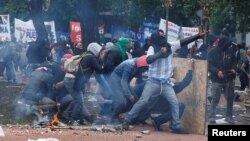Argentine police fired rubber bullets, tear gas and waters cannon at protesters who marched on Wednesday in front of Congress against the government's 2019 budget bill, which contains steep spending cuts aimed at erasing the country's fiscal deficit.
Thousands of activists gathered, led by teachers, social organizations and leftist groups opposed to President Mauricio Macri's austerity measures. Small clusters of protesters hurled rocks, sticks and trash at police who shot rubber bullets and used metal barriers to control the crowd.
Some protesters were seen hurling tear gas canisters back at police lines. Authorities quickly reinforced with a large group of motorcycle police who descended on the crowd.
The same riot control measures were used to push back protesters late last year when Congress approved cuts to Argentina's pension system.
Tensions are rising in Latin America's No. 3 economy, which is projected by the budget bill to contract 2.4 percent this year and 0.5 percent in 2019. Public utility subsidy cuts are forcing home heating and electricity bills higher, fueling inflation expected by the government at 42 percent this year.
The legislators began discussing the budget in a plenary session shortly before noon. Macri needs the budget to pass to maintain his economic adjustment plan and continue efforts to turn Argentina's recession-hit economy around.
As police moved to stem the violence, lawmakers inside the capitol building squabbled and argued loudly over sticking points, at times disregarding calls for order.
The budget features sharp reductions in government spending and tax increases aimed at cutting the primary fiscal deficit from a projected 2.7 percent of gross domestic product this year to zero in 2019.
Macri has committed to balancing the budget at the behest of the International Monetary Fund, which signed a $57 billion standby financing agreement with the government earlier this year. Macri went to the fund for help after market jitters about the country's increasing debt load caused a slide in the peso.
The local currency is down about 50 percent so far this year. On Wednesday it weakened 1.35 percent 37.15 to the greenback. Argentina is in the emerging markets spotlight as it prepares to host a meeting of the G-20 at the end of November.
Analysts expect the budget to pass, but are cautious about the government's ability to implement austerity measures. Some economists also fear the government may relax austerity measures ahead of the 2019 presidential election for political gain.
Because Macri's "Cambiemos," or "Let's Change" party, does not hold a majority in either chamber of Congress, it negotiated with some provinces to minimize the social impact of budget cuts in exchange for votes needed to pass the bill.
"We have important support, based on an agreement signed by the president with provincial governments to ratify several measures, among them the approval of the national budget," Congressman Luciano Laspina, who is affiliated with Macri's political party, said in an interview with local station Radio Mitre.





